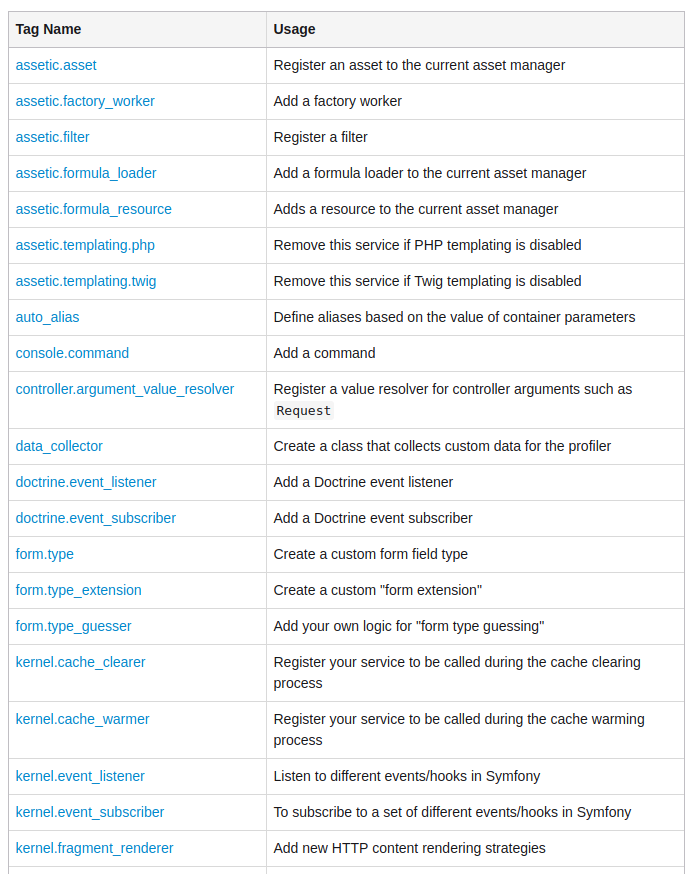Drop all Service Tags in Your Nette and Symfony Applications
What is new?
Updated with new Symfony 3.3 features class based service naming, _instanceof configuration and autoconfiguration (plus PHP 7).
It does pretty much the same, so package ServiceDefinitionDecorator for Symfony was deprecated.
It is still available here for inspiration though.
What is tagging for? Why we should get rid of it? Today I will show you, how to do it gradually without breaking the application.
This post is follow up to How to Avoid Inject Thanks to Decorator feature in Nette. Go read it if you missed it.
What is Tagging For?
# app/config/services.neon / app/config/services.yml
services:
simple_console_command:
class: "App\Command\SimpleConsoleCommand"
tags:
- "console.command"
It is a method to mark services, so Dependency Injection Container could find them easily.
With that, we can add all Commands to Console Application during Dependency Injection Container compilation.
$commands = $this->container->findByTag('console.command');
$application->addMethod('addCommands', [$commands]);
Bare Tagging is Duplicated Information
But is it really needed?
Without tags, you would probably write something like this:
$commands = $this->container->findAllByType(Command::class);
$application->addMethod('addCommands', [$commands]);
But it's here, because of historical reasons. Both Nette and Symfony ecosystem support it, so many packages adopted it without thinking twice.
The Only Place To Consider Using Tags: Metadata
If you need to setup service priority registration or any information, that you can't put inside the class itself, tagging is the only way:
# app/config/services.neon / app/config/services.yml
services:
simple_console_command:
class: "App\Command\SimpleConsoleCommand"
tags:
name: "console.command"
priority: 20
It's often used to duplicate information about a class or interface this service extends or implements. Symfony\Component\Console\Command\Command in this case.
How to get rid of them? Decorator to the rescue!
When I see this pollution in the code, I try to explain there is no added value. Till now, there was only solution in Nette and Symfony application were doomed to use this anti-pattern.
Now there is Decorator in Symfony as well. Let's see.
Get Rid of Tagging in Nette
In you Nette Application, you probably already use
# app/config/config.neon
services:
-
class: App\Console\FirstCommand
tags: [kdyby.console.command]
-
class: App\Console\SecondCommand
tags: [kdyby.console.command]
-
class: App\Console\ThirdCommand
tags: [kdyby.console.command]
-
class: App\EventSubscriber\FirstEventSubscriber
tags: [kdyby.subscriber]
-
class: App\EventSubscriber\SecondEventSubscriber
tags: [kdyby.subscriber]
-
class: App\EventSubscriber\ThirdEventSubscriber
tags: [kdyby.subscriber]
So much reading, huh? Imagine 50 more of these.
This is exactly the place to use Nette Decorator feature.
# app/config/config.neon
services:
- App\Console\FirstCommand
- App\Console\SecondCommand
- App\Console\ThirdCommand
- App\EventSubscriber\FirstEventSubscriber
- App\EventSubscriber\SecondEventSubscriber
- App\EventSubscriber\ThirdEventSubscriber
decorator:
Symfony\Component\Console\Command\Command:
tags: [kdyby.console.command]
Symfony\Component\EventDispatcher\EventSubscriberInterface:
tags: [kdyby.subscriber]
The more services you have, the more cleaner and readable code this approach brings.
Minitip
If you don't like the decorator and don't like to one service take 3 lines of config instead of 1, you can use this shortage:
# app/config/config.neon
services:
- { class: App\Console\FirstCommand, tags: [kdyby.console.command] }
This is what I did, before I used Decorator and before I dropped tags from my coding habbits.
Get Rid of Tagging in Symfony
Symfony has over 40 tags that are coupled to many internal parts. This is barely half of it:

If we use the same setup as we used in Nette above, in Symfony it would look like this:
# app/config/config.yml
services:
App\Console\FirstCommand:
tags:
- { name: console.command }
App\Console\SecondCommand:
tags:
- { name: console.command }
App\Console\ThirdCommand:
tags:
- { name: console.command }
App\EventSubscriber\FirstEventSubscriber:
tags:
- { name: kernel.event_subscriber }
App\EventSubscriber\SecondEventSubscriber:
tags:
- { name: kernel.event_subscriber }
App\EventSubscriber\ThirdEventSubscriber:
tags:
- { name: kernel.event_subscriber }
I want to quit this project already... but wait!
You can use new autoconfigure since Symfony 3.3
# app/config/config.yml
services:
_defaults:
autowire: true # recommended
autoconfigure: true
App\Console\FirstCommand: ~
App\Console\SecondCommand: ~
App\Console\ThirdCommand: ~
App\EventSubscriber\FirstEventSubscriber: ~
App\EventSubscriber\SecondEventSubscriber: ~
App\EventSubscriber\ThirdEventSubscriber: ~
That's it. Pretty cool, huh?
How do you Approach This?
Again, this is my point of view on making things easy, KISS and DRY.
How do you approach this duplication? What do you like about it apart "it's in the docs" or "everybody does that"?